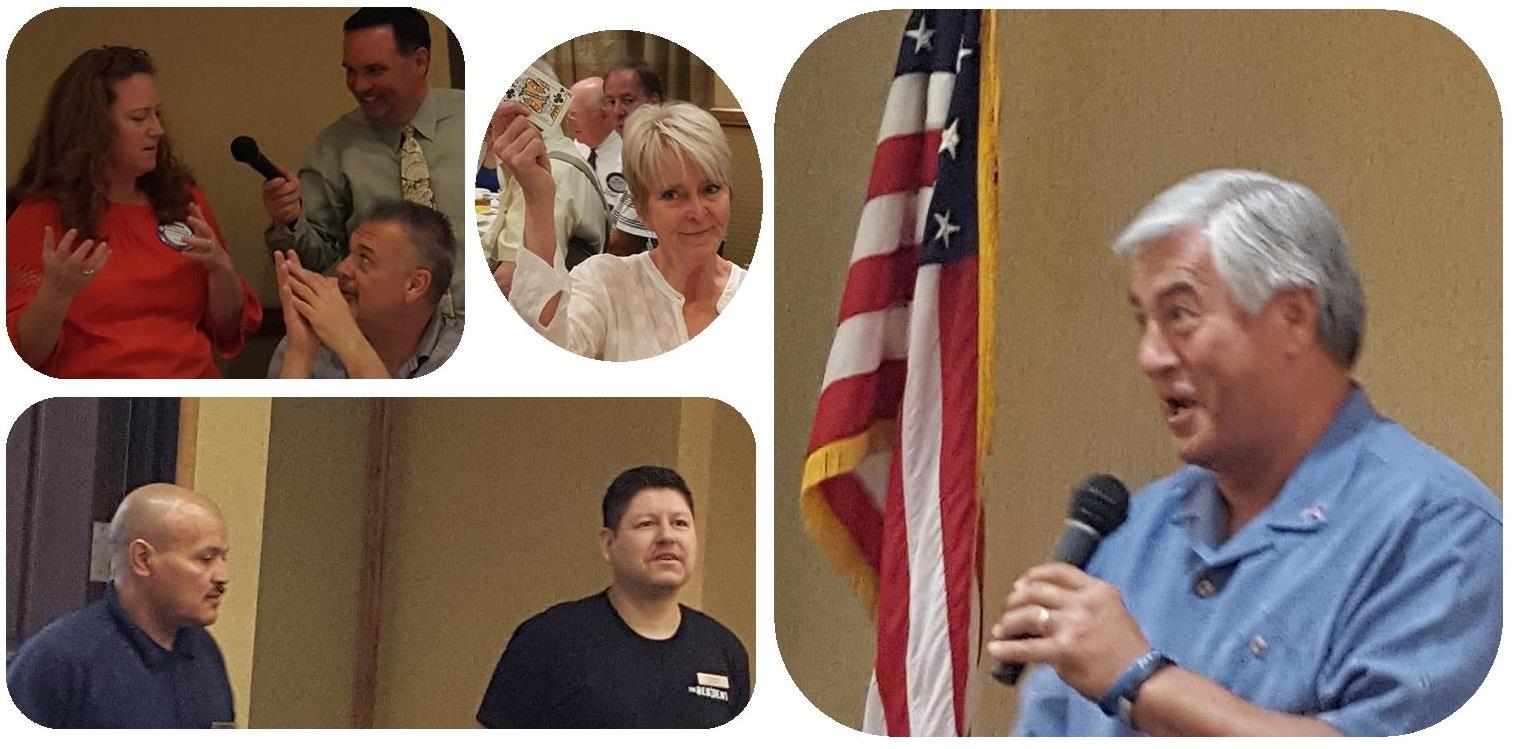 President Allan began the meeting by inviting Darl Andersen to offer the invocation and Warren Williamson to lead the Pledge of Allegiance. Noting that there were a number of past and future District Governors present, he asked them to stand and be recognized.
President Allan began the meeting by inviting Darl Andersen to offer the invocation and Warren Williamson to lead the Pledge of Allegiance. Noting that there were a number of past and future District Governors present, he asked them to stand and be recognized.Guests introduced at the meeting were: Tom Hallison - District Governor 2006-007 from Columbia, Washington; Jim Erikson from the Superstition Mountain Club to serve as DG 2018-19; Carolyn Jones; Judy Webb, a member of the E Club of Kansas; David Simmer from the Sedona Club to serve as DG 2019-20; Dick Thomas of Sun Lakes Rotary; Jackie Hildebrand from South Bend Indiana, and Bert Millett, Attorney and former/future member.
Judy Webb pulled the chips for the attendance drawing, after chips number 38 and 60 (belonging to absent rotarians) were drawn, she drew Dan Coons' chip making him the lucky recipient of $10 since no winning chip was drawn March 1.
Steve Ross handled the weekly raffle, announcing the weekly winner would receive $60 and if they drew the ace of clubs would win $974. He had Pam Cohen draw the winning ticket. She drew Chuck Flint's ticket number. When she drew from the deck of cards on Chuck's behalf, she drew the king of clubs, so the large pot will continue to grow.
Steve Ross briefly explained the buck board for the benefit of guests present, then circulated to allow interested members and guests to purchase squares on the board.
Greg Okonowski collected happy bucks from:
- Penny May who enjoyed fun in Hawaii with her sisters even though the weather wasn't great while they were there
- Chris Krueger celebrated International Women's Day and was thankful for the many women and mentors who had influenced her.
- David Simmer was thankful for the many Mesa West Rotarians he has had the pleasure to work with planning the Club Leadership Academy to be held in April.
- Terry Diedrick had been in Costa Rica the prior week and when he returned he was surprised to see the Snowy Truck at Tim Troy's House.
- Donna Goetzenberger was thankful that Dan Coons donated the cost of printing of business cards for outbound Youth Exchange Student, Yordi Miguel.
- Wendell Jones paid happy dollars for the eight of their 42 grandchildren which have March birthdays.
President Allan and Secretary Polly had token gifts which they presented the Hilton wait staff in appreciation of the wonderful service they provide the club throughout the year.
Announcements:
- The sponsor appreciation event will be held April 25 at the Arizona Museum of Natural History.
- A club survey was distributed at the meeting. Members were asked to complete their survey and either mail it in the envelope provided or bring it to the March 15 meeting. Members taking the survey can remain anonymous.
- Members were reminded to bring their recent issue of the Rotarian magazine featuring the 50th anniversary of Rotaract to the March 15 meeting. Ed Koeneman is trying to collect as many copies as possible for use with promoting the Grand Canyon University Rotaract Club.
- The March 15 meeting will feature our youth programs.
President Allan introduced the guest speaker. He and Polly met Judge Tommy Webb and his wife, Judy, at the Rotary Internation Conference in Atlanta in 2017. They were across the aisle from them on a very slow shuttle. They learned the Webb's would be visiting in Arizona in February and March of this year. Having learned of the amazing "survive and thrive" story of Judge Webb's life, they have been looking forward with great anticipation to having him speak at our club since last June. They heard him speak the week prior at Yuma Foothills Rotary Club.
Judge Tommy Webb began his presentation announcing that he was born in 1951, 2, or 3 in South Korea during the Korean Conflict. In fact, he has no idea when he was actually born. His mother was an alcoholic and a prostitute. He could not remember a time when he saw his mother sober, nor could he remember a time he was welcome in his own home (a tiny shack) at night. They lived in a tiny village of women and children in similar dwellings a short distance up hill from a marine base. He couldn't remember his mother giving him anything until she told him if he brought her tobacco, she would give him some of the things he was having to scavange for.
He started following marines who smoked. As soon as they would discard a cigarette butt, he would grab it. He learned which marines liked non-filtered cigarettes, because he could get more tobacco with less effort. He admitted he sometimes cheated and shredded some of the paper in the cigarette and put that in with the tobacco and hoped his mother would not notice.
At night, he would huddle with other children like himself near the barrels the marines would light fires in so they could stay warm while patrolling the rice paddies. For the children's safety, the marines would shoo them away, so they would not be shot when movement was detected in the area. The other way the children would try to stay warm was by burying themselves in the garbage, which would give off some warmth as it decayed. Sometimes they would find the remains of a child who had not survived. They also encountered rats and other animals as they tried to stay warm.
When he was probably six or seven, for some reason, he gathered the courage to try to find a better life for himself. He took off walking toward where they could see the lights of the city of Seoul. He did arrive there and found himself in a transportation depot, which was wonderful at first because food was plentiful. He could see that the travelers had bags of food for themselves to consume as they travelled. He figured out which people weren't keeping an eye on their food bag and he would run and grab it and keep running. As he ran, he would take out a small amount of food, drop the bag and keep running. The person chasing him would stop to pick up the bag and what had spilled out of it. He ate well for about three days until he ran into a policeman. The policeman told him to sit on a bench and stay there. After a bit a nice white-headed lady sat next to him and gave him a piece of candy and a hug. He had never been the recipient of either before. When the policeman came back, he asked Tommy if he wanted to go with him or with the white-headed lady. Not being stupid, he chose the lady. She took him to an orphanage.
After an oral examination, an educated guess established the year of his birth, and he was allowed to point at numbers and names of months to choose his own birthday for his official records. After about seven months in the orphanage, He was adopted by Roy Webb and his wife from Oklahoma. From the 39 pound orphan they adopted, he grew to play football, serve in the marines, become educated and ended up as a circuit court judge in the State of Kansas. He is a recognized leader in his field.
One of his passions is the power humans have of making a difference. He told of a book he read that made a significant impact on his own thinking and shared the primary point in the book that stood out for him. A teacher had a student in her class that seemed slow and did not interact much with the other students. He didn't dress well either. She took some perverse pleasure in putting big red X's next to his incorrect answers. Just before Christmas, the students gathered around the teacher's desk to watch her open the gifts they had brought for her. One gift was clumsily taped together. It contained a rhinestone bracelet with several stones missing and a partial bottle of perfume. The gift was from the awkward boy. The other students started to giggle. The teacher put the bracelet on and admired it. She put some of the perfume on her wrist and smelled it herself then held her wrist out so the other students could enjoy the aroma. After class, the boy lingered behind and told the teacher he was very glad she liked the gift. He told her it reminded him of his mother, who she remembered was deceased.
She took the time after that to look at his records and saw what other teachers had said about the student as his mother had experienced long-term illness and finally passed away and that the father was not supportive of the boy. After the Christmas holiday, it was almost as though the class had a new teacher. She worked to help all of the students find their strengths and overcome their challenges, but she particularly helped the forgotten child.
The boy stayed in touch with the teacher, letting her know when he graduated high school, college, and medical school. When he married, he invited his teacher to the wedding to sit where his mother would have sat if she were alive.
It is important in our encounters to get to know who we are dealing with and respond with warmth and compassion to bring out the best in each other. Judge Tommy Webb was the recipient of this kind of love following his horrific early childhood and is an example of how the human spirit can thrive when loved, encouraged and nurtured.
Before the Q and A session began, President Allan read a list of the many accomplishments on the Judge's record. When asked if there was ever a time the Judge experienced bitterness or felt resentment about his beginnings, he replied that as a teen, he had experienced hatred for his mother. He said that a minister at his church delivered a message about forgiveness being the beginning of healing. He took that message to heart and the minister helped mentor him through learning not only to forgive, but to feel love toward his birth mother.
Before the meeting adjourned, John Bethea announced that he would be participating in a childrens cancer run and would welcome anyone who wanted to support him or would provide information to anyone else who might want to participate.

